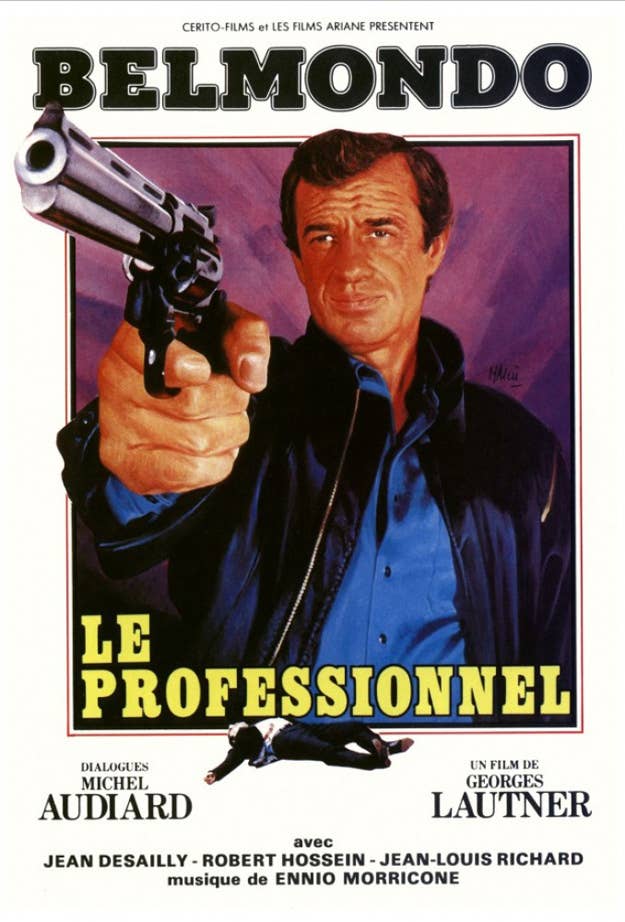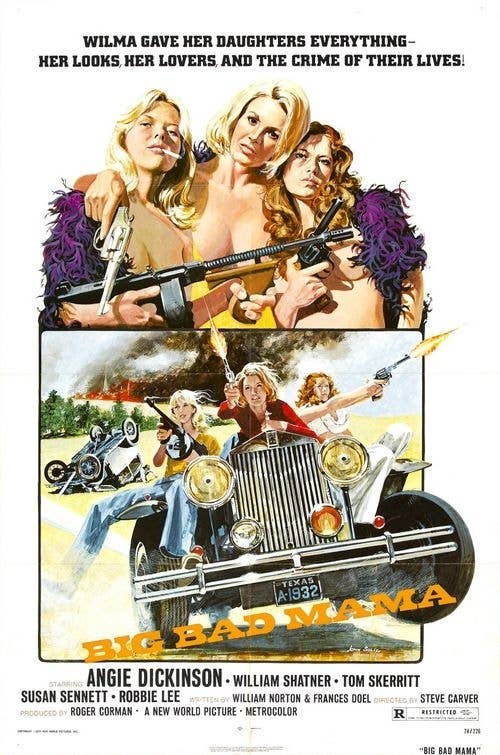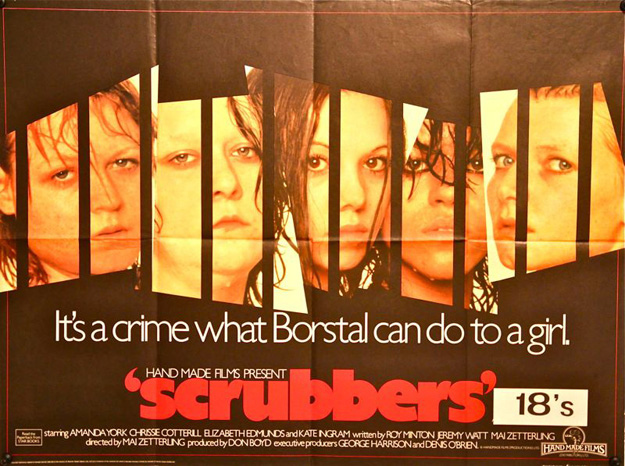
If Bourne stoked the fires of your hunger for spy cinema: Le Professionnel (1981, Georges Lautner)
Jean-Paul Belmondo, with his easy smile and effortless charm, made for an appealing faux-badass in the seminal Breathless eventually proved that he could be a genuine, straight-up badass as well; few are the films in which he’s more in tune with that side of his persona than Georges Lautner’s Le Professionnel. As Joss Beaumont, a French Secret Service agent double-crossed and left for dead in Africa after a politically-motivated assassination falls through, Belmondo is playing a man used to thinking three moves ahead of his adversaries, a talent that comes much in handy when he returns to France after two years in exile to exact vengeance on his former handlers. (Is he the bloody phantom of past diplomatic misdeeds, or is he just a cheesed-off dude with a talent for espionage?)
His nimble-minded protagonist is a perfect reflection of the screenplay. Penned by the prolific Michel Audiard and his son, future French-cinema darling Jacques, the script for le Professionnel is a sharp-witted and two-fisted thing, a propulsive spy caper that traffics in the lightness of the Bond films that serve as a glancing inspiration while finding subtle ways to let a strain of fatalism creep in. Lautner holds a steady hand over this script, allowing room for the story to breathe without letting it go slack and keeping a baseline of clarity amid the dirty dealings and double-crossings that are endemic to the genre. It’s part action-film brawl (featuring a sharp car chase around the Eiffel Tower) part enormously satisfying and often quite funny game of verbal, mental and political chess, and all showcase for Belmondo's wicked charisma. All of that dovetails into a climax that drops irony, just desserts, tragedy, bait-and-switch tactics and one towering checkmate move into a cocktail shaker, violently shudders one last drink out of it and demands you slurp it down. Refusing such a delectable concoction would be poor judgment.

If you're in the mood for guns, fast cars, cash, sex and a terrific performance by a Hollywood icon: Big Bad Mama (1974, Steve Carver)
By a lot of standards, Big Bad Mama is pretty pedestrian. The screenplay hits its Bonnie & Clyde-inspired beats evenly and perfunctorily; Steve Carver’s direction is functional at best and occasionally less so during the film’s copious action scenes; and the lumpy pacing allows for a number of sex scenes to disrupt the build of the second half’s escalating heists so that the film wanders from one setpiece to another without a whole lot of drive. But hardly any of this matters on the whole, because from the first frame to the last, Big Bad Mama is Angie Dickinson’s show. She’s able to embody both strong and sweet without feeling insincere in either direction, a rare talent indeed and one demanded by the script; if anyone ever needed a surefire demonstration of the benefits of talent married to star power, this film would make for a terrific example.
With a steel of spine and balls of brass, her character, Wilma McClatchie, is not the kind to take any guff or back down from any challenge — especially when it comes to building a life for her two daughters that doesn’t involve being dead broke. So naturally, after a chance encounter with a hotheaded ruffian (played with clumsy, frustrated intensity by Tom Skerritt), they take to robbing banks, rounding out their gang with a seedy, two-bit hustler (William Shatner) they pick up at a race track and coerce (read: Angie humps him) into being a getaway driver. The heists, played as broadly as possible, are amusing enough, and both Skerritt and Shatner get some good moments – Skerritt, in particular, seems to be having a whale of a time essaying a role that, in another universe, was tailor-made for Warren Oates. Plus I can’t fault the copious female nudity (I am only human). But without Dickinson cutting an imposing yet seductive figure across this film, it wouldn’t be nearly as fulfilling. She’s the heart and soul of Big Bad Mama. She makes this modest compendium of genre clichés into something more than it should be – a compelling and memorable time at the movies.

If you're in the mood for a grim 'n' gritty slice of British realist drama crossed with the women-in-prison genre: Scrubbers (1983, Mai Zetterling)
“Trouble is, you get bored, you get into trouble.” Boredom is a big concern for the residents of the all-female borstal in Mai Zetterling’s Scrubbers. Where contemporaneous representations of male borstal life (including Alan Clarke’s Scum, the writer of which also had a hand in scripting this) concentrate on the prison power hierarchy and the relentless violence done to inmates by guards and other inmates, Scrubbers sets its focus on day-to-day tedium, the sort of thing that can drive a person mad if they don’t have a way to cope – or even if they do. Annetta Brady (Chrissie Cotterill), for instance, has a focus and a way to cope: She’s obsessed with revenging herself on Carol Howden (Amanda York), whom she blames for her separation from her toddler-aged daughter. Other inmates take to extreme cleanliness, discovering ways to get high or hollering dirty limericks day and night. Whatever keeps the brain from eating itself, it seems.
The bare plot of Scrubbers involves the friction between Annetta, Carol and a butch inmate named Eddie who takes a liking to Carol, and it loops back to that plot whenever it has to push things along towards a standard resolution. And while it’s interesting to note that, of all the girls in the borstal, the only two who regularly resort to physical brutality are the scorned mother Annetta and the openly masculinized (down to the name) Eddie, this strand of straight storytelling feels obligatory, like someone somewhere along the line demanded a modicum of structure. Zetterling’s eye finds its subject in the grim, grey institutionalized hallways and cells of the borstal, in the drudgery of ritual and the incidents and images that penetrate through the haze of sameness. This isn’t a film to watch for story but rather to sink into the atmosphere and feel the milieu take over your life for an hour and a half. Long after the plot has been forgotten, I’ll remember individual images from this: the half-open cell windows at nighttime clanging with shouted declarations of love and items passed from window to window, the hand-painted sign reading HELLHOLE BITCHES above a painted-and-costumed group of inmates in a talent show, a stray pigeon smuggled inside a hat and hidden in a cupboard, an inmate in solitary drugged up and splayed in a Christ pose. (If Scrubbers sounds like something that interests you, get to watching that right quick — it expires from Netflix Instant on August 12th.)
The Netflix streaming library is vast and daunting and mostly filled with crap. Steve Carlson is the Netflix video clerk, and every week he hand-delivers three awesome movies you've never heard of before. He's been writing about movies in one form or another on the Internet since 2002 and co-hosts the Bad Idea Podcast. Someone once called him the lonely Magellan of exploitation cinema. He thinks that's the best compliment he's ever received.
